2009 Toyota Prius Tires & Services
Get Started
Complete Auto Care for Your 2009 Toyota Prius
-
TIRES FOR YOUR 2009 Toyota Prius View Tire Info GET TIRE PRICING
-
REPAIR FOR YOUR 2009 Toyota Prius View Repair Info SCHEDULE REPAIR
-
MAINTENANCE FOR YOUR 2009 Toyota Prius View Maintenance Info SCHEDULE MAINTENANCE
-
OFFERS FOR YOUR 2009 Toyota Prius Limited Time Tire Offers VIEW ALL COUPONS
2009 Toyota Prius Tires
Recommended Tires | Tire Information
2009 Toyota Prius Tires Sizes, Speed Ratings, and Inflation
Not sure about your 2009 Toyota Prius tire size? Use the following chart to find information on tire size, speed rating, and inflation.
| Trim Level | Speed Rating | Inflation in PSI F/R | Tire Size |
|---|---|---|---|
| 2009 Toyota Prius Touring* | V | 35 PSI/33 PSI | P195/55R16 |
| 2009 Toyota Prius Touring* | V | 35 PSI/33 PSI | P195/55R16 |
| 2009 Toyota Prius Touring* | V | 35 PSI/33 PSI | P195/55R16 |
| 2009 Toyota Prius Touring* | V | 35 PSI/33 PSI | P195/55R16 |
| 2009 Toyota Prius Base* | S | 35 PSI/33 PSI | P185/65R15 |
| 2009 Toyota Prius Base* | S | 35 PSI/33 PSI | P185/65R15 |
| 2009 Toyota Prius Base* | S | 35 PSI/33 PSI | P185/65R15 |
| 2009 Toyota Prius Base* | S | 35 PSI/33 PSI | P185/65R15 |
|
2009 Toyota Prius Touring* Speed Rating: V Inflation F/R: 35 PSI/33 PSI |
|
2009 Toyota Prius Touring* Speed Rating: V Inflation F/R: 35 PSI/33 PSI |
|
2009 Toyota Prius Touring* Speed Rating: V Inflation F/R: 35 PSI/33 PSI |
|
2009 Toyota Prius Touring* Speed Rating: V Inflation F/R: 35 PSI/33 PSI |
|
2009 Toyota Prius Base* Speed Rating: S Inflation F/R: 35 PSI/33 PSI |
|
2009 Toyota Prius Base* Speed Rating: S Inflation F/R: 35 PSI/33 PSI |
|
2009 Toyota Prius Base* Speed Rating: S Inflation F/R: 35 PSI/33 PSI |
|
2009 Toyota Prius Base* Speed Rating: S Inflation F/R: 35 PSI/33 PSI |
* Note: these models have different tire sizes depending on vehicle options.
Recommended Tires for Your 2009 Toyota Prius
What tires are best for a 2009 Toyota Prius? Check out the following tire brands and types.
 Blizzak WS90
Blizzak WS90
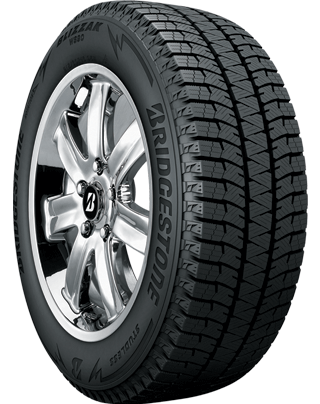
- No warranty
- Winter
- Winter
 Ecopia EP422
Ecopia EP422
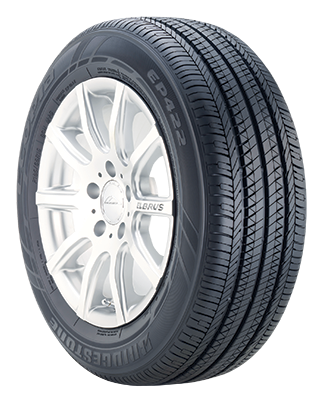
- Platinum Pact Limited Warranty
- All-Season
- Performance
 Potenza RE71RS
Potenza RE71RS
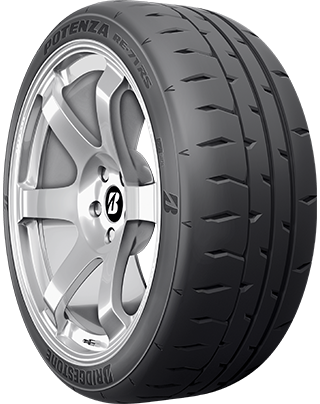
- No warranty
- Summer
- Performance
 Ecopia EP422 Plus
Ecopia EP422 Plus
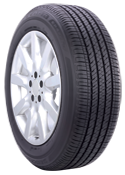
- Platinum Pact Limited Warranty
- All-Season
- Performance
 WEATHERPEAK
WEATHERPEAK
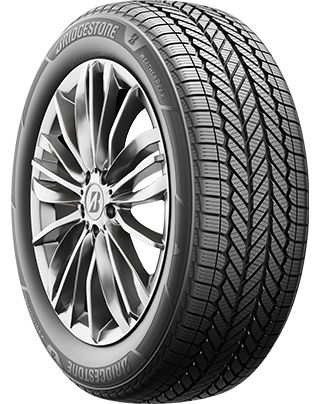
- Platinum Pact Limited Warranty
- All-Season
- Passenger Tires
 Firehawk Indy 500
Firehawk Indy 500
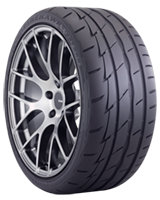
- Gold Pledge Limited Warranty
- Summer
- Performance
 WEATHERGRIP
WEATHERGRIP
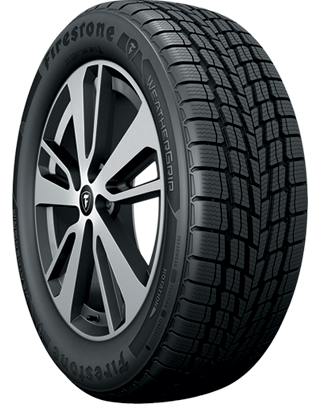
- No warranty
- All-Season
- Passenger Tires
 ALL SEASON
ALL SEASON

- No warranty
- All-Season
- Passenger Tires
 Winterforce 2
Winterforce 2
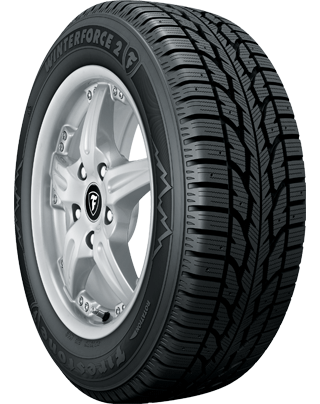
- No warranty
- Winter
- Winter

- No warranty
- All-Season
- Passenger Tires

- No warranty
- All-Season
- Passenger Tires
 Extensa A/S II
Extensa A/S II

- No warranty
- All-Season
- Passenger Tires
Choosing 2009 Toyota Prius Tires
Beyond the correct tire size, there are a couple of other factors to consider when buying Toyota Prius tires like where and how you drive, and what tire brand you trust most. Think about where you live (countryside vs. city vs. mountains) and the kind of unexpected weather you're likely to experience when evaluating your driving conditions. Drivers in states that fully experience all four seasons often buy two sets of tires: one for summer and one for winter. Other drivers buy one set of all-season tires instead. That way they don't have to return to the tire shop and their vehicle is always ready for sun, rain, and light snow!
Driving style is next on the list to think about when buying tires. If you're an avid off-roader who yearns to pioneer new paths, you have very different tire needs than a highway commuter who doesn't hit the hills very often. Browse Toyota Prius tires online or come to your nearby Firestone Complete Auto Care for help selecting the tire that's right for you.
Toyota Prius Installation and More
Firestone Complete Auto Care has been a leading tire provider for more than a century. We're your one-stop shop for tire installation, rotation, and ongoing maintenance! We make it easy to buy new 2009 Toyota Prius tires online and book an installation appointment at the same time.
Questions About 2009 Toyota Prius Tires
-
Why does Toyota tire inflation matter? A small decrease in tire pressure can have a big impact on your driving. Maintaining proper tire pressure can help improve braking time, increase fuel economy, and boost tire lifespan.
-
Why are there numbers on the side of my Toyota Prius tires? Your tire sidewall gives you information about load carrying capacity, speed rating, treadwear, traction, and tire size. Talk to one of our tire technicians to learn how to read the numbers on your tire!
-
How do I check the tread depth on my Toyota tires? Stay on top of your tire tread depth to help avoid a dangerous drive. You can check tread depth with a penny. Hold the penny so that Abraham Lincoln is facing you, then place your penny into a tread groove upside down. If you can see the top of Abe’s head, your tread is shallow and it might be time for new Toyota Prius tires. Grab a penny. Hold the so that Abe Lincon's head is facing you and his hair is pointing toward the ground. Then, place the penny into a tread groove. If you can see the top of Abe’s head, your tread is shallow and it might be time for new Toyota Prius tires.
Types of 2009 Toyota Prius Repairs
Want more details? Choose a service below to read more about Toyota Prius repairs at Firestone Complete Auto Care.
Get Repairs for Your 2009 Toyota Prius
No driver looks forward to car repairs. We’re here to change that, though. At Firestone Complete Auto Care, we want to make car repair painless and hassle-free. When it’s time for 2009 Toyota Prius repair services, head to your nearest Firestone location and rest easy knowing that your Prius is in capable hands. Before we begin any repair work, we’ll diagnose any issues and answer your questions about potential repair options. If a repair isn't necessary, we won't recommend it.
How Much Are Toyota Prius Repairs?
Several factors can affect the cost to repair your 2009 Toyota Prius, including which repairs are needed, prices of appropriate replacement parts, how much labor the repair will take, and where you live. No matter what state you’re in, be sure to look through our offers and online coupons for repairs.
A few different aspects can influence repair costs for your 2009 Toyota Prius, like
2009 Toyota Prius Auto Repair Questions
-
Can scheduled maintenance help me avoid repairs? The cheapest 2009 Toyota Prius repair is the one that isn’t necessary in the first place! Staying up-to-date with your car’s scheduled maintenance services is a great way to keep future repair costs low.
-
Should I bring my Toyota in even if I can't pinpoint the problem? You’re in your car, day in and day out. So, it’s only expected that you know your car better than anyone else! If you notice mysterious smells, strange engine noises, or other out-of-the-ordinary symptoms while driving, trust your instincts and stop into Firestone Complete Auto Care for a Courtesy Check. Catching a potential issue early could help prevent Toyota Prius repairs.
-
Do I have to get the repairs you recommend for my Toyota? Trust is more than just a saying on the wall. It’s a window underneath it. That’s why we won’t recommend services or repairs for your 2009 Toyota Prius unless we think they’re vital to your safety on the road.
2009 Toyota Prius Brake Repair
Your Toyota Prius engine may be strong and reliable. But if you can't stop it, then it's scrap metal. If you’re experiencing squeaky brakes or a loss of braking power, don’t wait! Safe driving is difficult when your brakes are anything but their best. What's more, waiting for things to figure themselves out can result in more damage to your brakes and your wallet. Visit Firestone Complete Auto Care for the right brake repair for your 2009 Toyota Prius. We offer many affordable brake repairs like pad/shoe replacement, brake rotor/drum machining, brake fluid exchange/bleeding, and wheel cylinder and brake caliper installation.
Questions About Your Toyota Prius Brakes
-
Why does my Prius shake when I brake? Feeling shaking or vibrating in your Prius as you brake might indicate a few different problems, including worn brake pads or rotors, loose suspension components, damaged brake calipers, or warped rotors. Book an appointment for a free brake inspection as soon as you notice a problem with your brakes.
-
How long should my Prius brake pads last? You can usually get around 30,000 to 40,000 miles out of your brake pads, but how and where you drive your Prius can affect this. Hauling large loads or riding your brakes can shorten their lifespan, while smoothly braking and mostly sticking to highways can help your brake pads last longer.
-
Can brake fluid leak when my Prius is off? Your Prius brake system is a closed hydraulic system, which means that the brake fluid should not leak out of the system under normal circumstances. However, over time, the various components of the brake system can wear out or become damaged, which can cause brake fluid to leak out of the system.
Repairing Your Toyota Prius Drivetrain
Drivetrains for front, rear, and all-wheel-drive and 4WD vehicles are not all the same. You don't want to go to any random shop for drivetrain repair. You want to visit Firestone Complete Auto Care. We can fix many 2009 Toyota Prius drivetrain components Your Toyota Prius may need driveshaft attention if you feel resistance when turning, heavy vibrations in your floorboards, clunks when shifting, or vibration as your vehicle accelerates.
2009 Toyota Prius Drivetrain Q&A
-
How do I know if my Toyota drivetrain is damaged? Noises toward the back of your Toyota Prius, leaking fluid, trouble turning — these could all be signs of drivetrain damage you want to address. Take action before something more severe happens.
-
What causes a Prius’s malfunction indicator light (MIL) to illuminate? A multitude of problems can activate your Prius’s malfunction indicator light (better known as the check engine light), including issues with the engine, transmission, sensors, electrical system, or connectors.
-
Is a drivetrain malfunction in my Prius serious? If your Prius has a drivetrain malfunction, don't wait. Get it checked out by a professional mechanic. Identifying the underlying cause and performing the appropriate repairs right away can help prevent further damage and avoid unsafe driving conditions.
Wheel Alignment for 2009 Toyota Prius
Alignment services involve precise adjustments to your Toyota Prius’s suspension system, which connects the wheels with the rest of the vehicle. During the service, calculated changes are made to the angles of your tires. This is so that your tires hit the road at an optimal angle for your vehicle’s performance — just as Toyota intended. Bring your 2009 Toyota Prius in for a wheel alignment and we'll start with an alignment check. Then, we’ll adjust the angles as needed until they match recommended measurements from Toyota.
Answers to Toyota Prius Alignment Questions
-
What can knock my Toyota Prius out of alignment? Hitting a pothole or curb can alter your wheel alignment. So can general wear and tear over time.
-
How often should you get a wheel alignment for your Prius? Generally, it’s wise to have your alignment looked at around every 6,000 miles or 6 months, whichever happens first. You should check your Prius owner’s manual to verify Toyota’s suggested interval.
-
Do you need to get your Prius wheels aligned? While you don’t necessarily need to get an alignment when putting new tires on your Prius, it’s still a good idea. Ensuring your wheels are properly aligned can help support optimal handling, tire wear, and fuel efficiency.
2009 Toyota Prius Engine Repair
When your Toyota Prius engine needs repairs, our expert techs will let you know what needs to be done and why before they get started. We don't start working until we have your approval. If a repair isn’t urgent right now, we’ll let you know. We'll also tell you if it's necessary for your safety. We want to give you all the details you need to make an informed decision about your engine repairs. Turn to Firestone Complete Auto Care for your 2009 Prius engine repairs and you can feel confident knowing that we use Toyota-approved parts and components like the timing chain or belt, oil gasket, fuses, or other parts.
Questions About 2009 Toyota Prius Engines
-
Why does the check engine light come on when I start my Prius? Generally, your check engine light turning on upon ignition is not a bad thing. It’s just your Prius firing up its circuits. The light should turn off in a bit, but come see us if it doesn't.
-
Are Toyota Prius engine noises bad? Strange under-the-hood noises can point to problems within your Toyota Prius engine. Tapping or knocking could mean you need an oil change. Whistling sounds could mean you have an intake leak or misaligned belt. Squealing may be caused by a loose fan belt, and grinding could be a sign that something is wrong with your brakes — not the engine.
-
What could damage my Toyota Prius engine? Certain driving habits can damage your engine and should be avoided. These habits include 'running on fumes,' revving the engine while still in Park, or pushing 'the pedal to the metal' before the engine has warmed up. Help sustain your engine’s performance and efficiency by staying miles away from these bad driving practices.
Get Your Toyota Prius Tire Repaired
If the road has been rough on your 2009 Toyota Prius tires, Firestone Complete Auto Care can help. In some cases, a tire doesn’t have to be replaced – it can be plugged and patched with a simple repair. Depending on the damage, though, a repair might not be the right move. Our technicians can determine which option is best for your situation. We'll start by evaluating the state of wear, the location of damage, type of damage, and the size of the damage.
If your 2009 Toyota Prius tire puncture can be repaired, we’ll get to work on the steps to fix it: (1) Take the tire off the wheel for easy inspection, (2) fill the puncture to keep the moisture out, and (3) seal the inner liner with a repair unit to prevent air loss.
Your Questions About Toyota Prius Tire Repair, Answered
-
How soon should I have my flat tire repaired? Driving on a flat tire is not a good idea. Your Prius engine will keep running with a flat tire, but you could damage your wheel by continuing to drive on a flat.
-
Can I use an emergency/temporary sealant to fix my Toyota's flat tire? A temporary sealant may be able to help you get to a repair location safely. But temporary or emergency sealants could possibly damage TPMS sensors, and in some cases may even void the warranty on your Bridgestone or Firestone tires. If your tire needs extensive repair, sealant can add time and labor costs to the process.
-
What is causing the tires on my Prius to keep losing air? Possible reasons for your Prius tires continuously losing air include a leaking valve steam, wheel damage, and a puncture or hole in the rubber.
2009 Toyota Prius Maintenance
When it comes to your Toyota Prius, how you treat your car makes all the difference in its performance. With proactive maintenance, your Prius could be on the road well past the 200,000 mile mark.
2009 Toyota Prius Maintenance Schedule
What is the manufacturer recommended maintenance schedule for a 2009 Toyota Prius? Find maintenance info for your vehicle.
Guide to 2009 Toyota Prius Scheduled Maintenance
There's no need to guess when it's time to get Prius maintenance, and no need to wait until something goes wrong. Rely on the recommended maintenance schedule that’s been created just for your 2009 Toyota Prius! This recommended maintenance schedule is written by the auto manufacturer, Toyota themselves. Scheduled maintenance services can vary depending on driving conditions, climate, and other factors; however, there’s a good chance that your vehicle’s recommended maintenance services will include tire rotations, vital fluid checks/exchanges, filter changes, brake pad replacement, and oil changes. Staying on track with routine service appointments can help your Prius perform better, decrease your risk of dangerous malfunctions on the road, and help you avoid expensive repairs caused by 2009 Toyota Prius problems later.
Essential Maintenance to Keep Your 2009 Toyota Prius Running Newer, Longer
Head to your nearest Firestone Complete Auto Care in your 2009 Toyota Prius for factory-recommended routine maintenance and our technicians will jump right in with a Courtesy Check. A Courtesy Check helps "set the stage" for your service and catch any small problems before they turn into big repairs. Each Courtesy Check includes a free battery test and an inspection of your Prius's windshield wiper blades, head and tail lights, filters, fluid levels, tires, and alignment.
Firestone Complete Auto Care is your one-stop shop for 2009 Toyota Prius maintenance and repairs. We can help you keep your vehicle (and your life!) running smoothly. Many of our locations have weekend and evening hours for your convenience.
Questions About 2009 Toyota Prius Maintenance
-
When should I have Toyota Prius alignment checked? Check your car for pothole damage! If you’ve recently hit a pothole (or even if you don’t remember hitting one… they can be sneaky!) check your tire treads, tire sidewalls, and wheels for damage. Potholes can also knock your car out of alignment, so have your alignment checked if you suspect you’ve driven over a rough patch of road lately.
-
When should I use high mileage oil in my Toyota Prius? Got 75,000+ miles on the odometer? Consider high mileage motor oil. High mileage oil is formulated to address the specific problems encountered by high mileage vehicles, or those with more than 75,000 miles. It can help reduce oil consumption, smoke, and emissions from older Toyota Prius engines.
-
Why are my Toyota dashboard lights on? Don't ignore dashboard warning lights! Bring your Toyota Prius in for a diagnostic code scan as soon as a dashboard warning light flashes on, whether it's your check engine or battery light. Dashboard lights alert you to trouble under the hood.
2009 Toyota Prius Battery Replacement & Size
Researching battery replacements for your Toyota Prius?
| Battery | Engine | Warranty | Cold Cranking Amps | |
|---|---|---|---|---|
| L4/1.5L | Replacement months | Performance months | ||
| L4/1.5L | Replacement months | Performance months | ||
| L4/1.5L | Replacement months | Performance months | ||
| L4/1.5L | Replacement months | Performance months |
Car Batteries for 2009 Toyota Prius
Generally, car batteries last from three to five years. You want to replace your 2009 Toyota Prius battery before it fails and leaves you stranded. Pay attention to clues that your battery is on its way out. A lagging starter, an illuminated check engine light or battery signal, swollen battery case, corrosion-covered posts, or faded headlights can all signal that your battery needs attention.
Plus, at Firestone Complete Auto Care, we’ll test your battery for free. Drop in for a free battery check and, if necessary, a battery replacement to help keep your 2009 Toyota Prius running! Car batteries are only one of our many strong suits. Our technicians are familiar with Toyota-specific recommendations for Prius car batteries’ reserve capacities and cold cranking amps. Get help choosing the battery size that matches your vehicle, and schedule a weekday or weekend battery replacement service for your car.
Top Toyota PriusCar Battery Questions
-
Why won't my Toyota Prius battery stay charged? A battery that won't hold a charge is almost as good as dead. The battery might be old. Or, you may have a habit of leaving your car doors open and the lights on overnight. Stop by for a free battery test at your local Firestone Complete Auto Care to learn more about the state of your battery.
-
How long can I expect my car battery to last? Car battery lifespan varies depending on a few factors, including driving conditions, accessories, how well it’s maintained, and the type of battery. On average, a car battery lasts about three to five years.
-
Why is there white, crusty buildup on my Prius’s battery post? If you notice white, crusty stuff around the battery terminals of your Prius, it's likely corrosion. A chemical reaction between battery acid and the air can create a white, powdery substance that builds up over time on the terminals. This buildup can interfere with the electrical connection between the battery and your Prius’s electrical system, potentially leading to poor performance, difficulty starting, and other issues.
2009 Toyota Prius Oil Changes
Your 2009 Prius’s oil should be changed according to Toyota’s recommended oil change intervals. Outside of Toyota-recommended oil change intervals, your Prius may need an oil change if your check engine light is on, you hear knocking sounds coming from the engine, sense an oil smell in the cabin, or see an excess amount of vehicle exhaust. You might need an oil change more frequently than what’s recommended by Toyota if you regularly haul heavy loads, drive in dusty areas, adventure off-road, or go at low speeds on long distance trips.
Whether it’s synthetic, conventional, or a blend of both — your local Firestone Complete Auto Care has the right oil for your Toyota Prius. Talk with a teammate and consult your owner's manual before picking a motor oil. At Firestone Complete Auto Care, you can choose from the following oils: Quaker State® Advanced Durability™ conventional oil, Pennzoil® High Mileage Vehicle® motor oil, Pennzoil Platinum® Full Synthetic motor oil with PurePlus™ Technology, and Shell Rotella® heavy-duty engine oil. In an oil change service, a technician will change your Prius's oil, replace and recycle your used oil and filter, inspect all of your other filters, refill vital car fluids, and visually inspect the rest of the vehicle. Make an appointment for an oil change service today and let the oil experts take care of your Prius's engine.
Oil Change Q&A for Your 2009 Toyota Prius
-
Why is the oil light on in my Toyota Prius? Your Toyota Prius oil change reminder light might illuminate if it’s been too long since your last oil change. On the other hand, the oil pressure light might illuminate due to a clogged oil filter, a faulty oil pressure sensor, low engine oil levels, or a malfunctioning oil pump.
-
Can I change my Toyota Prius oil at home? First off, changing your own oil isn’t as easy as you’d think. You’ll have to buy special tools and figure out a way to recycle the old oil properly. Getting a professional oil change reduces the risk of something going wrong during the service, but also helps your car perform down the road.
-
Why is my Toyota exhaust smoke gray or blue? There could be an oil leak and your engine is burning oil. Time to have a qualified technician check things out. The leak could be caused by several issues like leaking valve seals, damaged piston rings, or worn cylinder walls.
2009 Toyota Prius Engine Tune-Ups & Maintenance
Periodic tune-ups can bring more power back to your Prius’s engine. The Firestone Complete Auto Care location in your community offers several Toyota Prius engine tune-up services. One option is the standard Firestone Tune-Up. The standard Firestone Tune-Up includes new spark plugs (and installation!), a thorough inspection of engine components, and a lifetime parts warranty*. Another service option pays special attention to the filters in your Prius. Specifically, we replace the fuel filter and air filter. Our third service is a thorough cleaning of the fuel system. During this type of tune-up, we use a three-step process to get rid of harmful varnish, dirt, and carbon deposit buildup in your Prius’s fuel injectors, throttle body, and throttle plate. This can improve your fuel system’s performance (and therefore, your engine’s performance). Consider this when choosing a tune-up service for your Prius: your vehicle’s maintenance record and mileage can determine which service is best. Chat with a Firestone technician before you jump into a specific service to ensure your engine tune-up money is well-spent.
*Talk to a Firestone Complete Auto Care teammate for full terms and conditions on warranties.
2009 Toyota Prius Engine Tune-Up Q&A
-
When should Toyota Prius spark plugs be replaced? When it’s time to replace the spark plugs, don’t delay. These small (but vital!) parts provide the electric spark that your car needs in order to start, and old spark plugs can prevent your car from starting at all. Replace spark plugs on time or about every 30,000 miles or so.
-
What should I do if I see leaks under my Prius? Puddles could indicate that your vehicle is leaking coolant, oil, or brake fluid. Ignoring these leaks can lead to permanent engine damage, so address these symptoms ASAP with a tune-up service.
-
How often do Toyota Prius fuel injectors need to be cleaned? The cleaning schedule for vehicle fuel injectors varies depending on your driving conditions and the type of fuel you use. Some manufacturers suggest cleaning your fuel system as part of routine maintenance, while others will recommend it on an as-needed basis if you’re experiencing poor performance. Reference your Toyota owner’s manual for exact guidelines.
Suspension Service & Repair for 2009 Toyota Prius
During the first few years you had your 2009 Toyota Prius, you and your passengers probably enjoyed a ride that was smooth and balanced. But these days, things are starting to feel a bit rough. Perhaps your Prius feels bouncy, pulls to one side, or makes an unusual noise when going over a speed bump. The first sign of trouble is the best time to bring your 2009 Toyota Prius in for steering and suspension services. We’ll get to the root of the issue and, if your car needs steering and suspension repairs, we’ll explain what your car needs and how much it’ll cost to get it done. We won't begin any work without your permission.
2009 Toyota Prius Steering & Suspension Questions
-
Why does my Toyota Prius bounce so much? Damaged struts or shocks can't dampen road bumps properly, causing your vehicle to feel like a trampoline after each dip or bump.
-
Why does my Prius tilt forward when I hit the brakes? The forward momentum and weight transfer to the front wheels during braking can cause your Prius's front end to dip forward. A damaged or faulty suspension system may fail to distribute the weight and force effectively, causing the front end to dip even more.
-
What role do tire pressure and tread depth play in my Toyota's suspension? Proper tire care can reduce strain on the suspension system, and also alert you to the need for new tires. Uneven tire wear is one sign of steering and suspension system problems, but it can also contribute to more.
2009 Toyota Prius A/C Service Near You
Our trained technicians will do what they can to solve your 2009 Toyota Prius A/C problems. During an A/C performance check, we'll determine the condition of your 2009 Toyota Prius A/C system to determine whether repair work is needed. This check will include an examination of system pressure, a visual inspection, and a leak test.
While your 2009 Toyota Prius’s air conditioner is being serviced, we’ll also do an A/C evacuation and recharge. During this process, a technician will remove the old refrigerant from the A/C system. Next, they will evacuate the system according to Toyota's recommendations. Finally, we’ll recharge the A/C system with new refrigerant.
2009 Toyota Prius A/C System FAQs
-
What’s making my Prius A/C put out warm air? An A/C blowing hot air has several possible root causes. There could be an issue with your compressor clutch, a blown fuse, a leak, or a clog in the expansion valve.
-
What causes A/C system leaks? A/C system leaks are often due to a combination of age and moisture. Rubber seals and gaskets naturally degrade over time, allowing refrigerant to exit and moisture to enter your Prius's A/C system.
-
Why won’t my Prius’s A/C cool the vehicle when the car is stopped? If your A/C only works when the vehicle is moving, there could be a problem with part of your Prius’s A/C or electrical system. Potential issues include low coolant or a faulty cooling fan.
Transmission Services for 2009 Toyota Prius
The transmission delivers power from the engine to the wheels so that you can drive on your terms. Since the transmission has to translate the precise amount of power for your desired amount of speed, even the smallest transmission problems should be addressed right away. 2009 Toyota Prius transmission problems can show up as shifting delays, grinding or jumping during acceleration, the car shaking at any speed, or whistling noises and a burning smell coming from under the hood. Let Toyota Prius transmission problems linger and your could suffer a loss in fuel efficiency or find that you can't drive your Prius at all. Our technicians know how to service your 2009 Prius up to Toyota-recommended standards. Schedule an appointment at your local Firestone Complete Auto Care at the first sign of transmission problems to help keep your engine running at peak performance.
2009 Toyota Prius Transmission Questions & Answers
-
How often does my Prius transmission fluid need to be checked? Regularly checking and exchanging your 2009 Prius’s transmission fluid is one of the best ways to help the transmission system perform. Some technicians would say that between 30,000 and 60,000 miles is a good timeframe for having your Toyota's transmission fluid checked and replaced, but that timeline can vary depending on how your vehicle is used and your manufacturer’s recommendations. The good news is that transmission fluid leaks are affordable to repair and easy to spot.
-
Is it possible for transmission fluid to leak from my Toyota Prius? Over time, transmission fluid can leak from your Toyota Prius, potentially causing transmission problems. A transmission fluid leak may be caused by a damaged transmission pan, faulty transmission cooler lines, worn-out seals, a cracked transmission housing, or an overfilled transmission.
-
Should I avoid driving my Toyota Prius if there is a transmission fluid leak? You should avoid driving with a transmission fluid leak. Your transmission system relies on transmission fluid to operate properly, and a leak may decrease performance, cause your Prius to overheat, or even lead to transmission failure.
2009 Toyota Prius Inspections
When you bring your vehicle to Firestone Complete Auto Care for any service, we’ll automatically do a multi-point Courtesy Check. First, a technician will pop the hood on your Toyota Prius and test the battery to determine how much charge remains. After we’ve inspected your Toyota Prius’s battery, we’ll visually inspect your filters, lights, wiper blades, alignment, tires, hoses, belts and fluid levels.
Every service performed at your nearest Firestone Complete Auto Care will include a Courtesy Check, but you can also request a Complete Vehicle Inspection for your 2009 Toyota Prius if you suspect there may be a bigger problem. In addition to a visual check of everything that's included in a Courtesy Check, a Complete Vehicle Inspection also includes a thorough manual inspection of your steering and suspension system, brakes, and exhaust components. With this inspection, we want to help you stay on top of any issues that may wreak havoc on your 2009 Toyota Prius if left unaddressed.
Depending on your location, you may be able to complete your vehicle’s safety tests or state inspection at your nearest Firestone Complete Auto Care. Inspections are performed on a state-by-state basis and requirements vary.
FAQs for 2009 Toyota Prius Vehicle Inspections
-
When does my Toyota Prius need an inspection? It needs a check-up if something feels 'off' to you, the driver. Your Toyota Prius could benefit from a Courtesy Check if it has any illuminated dashboard lights, you hear weird noises coming from any part, the engine doesn't start sometimes, or your vehicle pulls to one side.
-
Help! My 2009 Toyota Prius failed the state inspection test. Can you get it to pass? There's a good chance we can. Stop by for a full system inspection and we'll get to the root of the issue.
-
When’s the best time to have a complete vehicle inspection performed on my Toyota Prius? The best time to get a complete vehicle inspection for your Toyota Prius is before going on a road trip for the peace of mind. Another great time is when something abnormal occurs, and you can't pinpoint the issue. You might notice new dashboard lights, hear strange noises from under the hood, or your steering wheel doesn't feel like it once did.
2009 Toyota Prius Radiator Service
Regular, proactive service on the radiator in your 2009 Toyota Prius is essential for long-term engine health. To keep your radiator functioning, Toyota recommends replacing your antifreeze or coolant at scheduled intervals but it’s also wise to keep an eye out for signs of a failing radiator. Your radiator could be close to causing an engine breakdown if you notice a low coolant light or higher-than-normal engine temperatures on your dashboard, or if you spot coolant leaks coming from your car.
At Firestone Complete Auto Care, we start by performing a thorough inspection of your Toyota Prius cooling system. Then, we’ll move on to a machine-powered coolant exchange. Finally, we’ll refill the flushed sealants, lubricants and chemicals, then do a pressure check to catch any possible leaks. If you’re about to lose your cool over a too-hot engine, rest assured that we’ll take excellent care of your 2009 Toyota Prius at Firestone Complete Auto Care.
Questions About Toyota Prius Radiators
-
What does the coolant light on my Toyota dashboard mean? f the coolant light illuminates on your dashboard, your engine could be overheating. Pull over to a safe area and wait for the engine to cool down. Then, head to your nearest Firestone Complete Auto Care for a coolant system check.
-
What can cause my Prius to overheat? Low coolant, a damaged cooling fan, a faulty water pump, a malfunctioning thermostat, or a clogged radiator could all cause your Toyota Prius engine to overheat.
-
What is making my Prius radiator sound like it’s boiling or rumbling? There could be air pockets in your Prius’s cooling system. You might also have a clogged radiator or faulty radiator cap (this last one is an easy fix!).